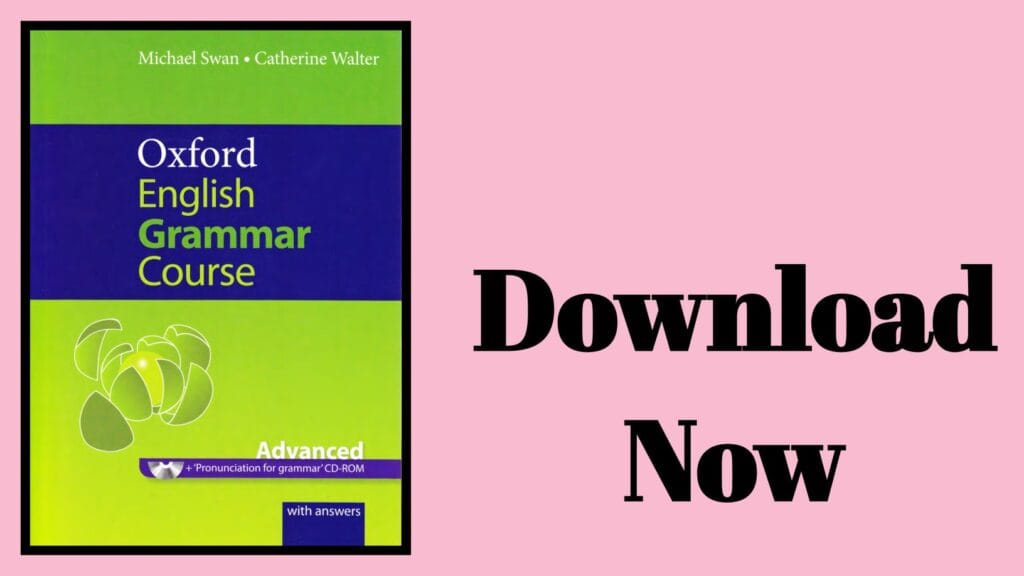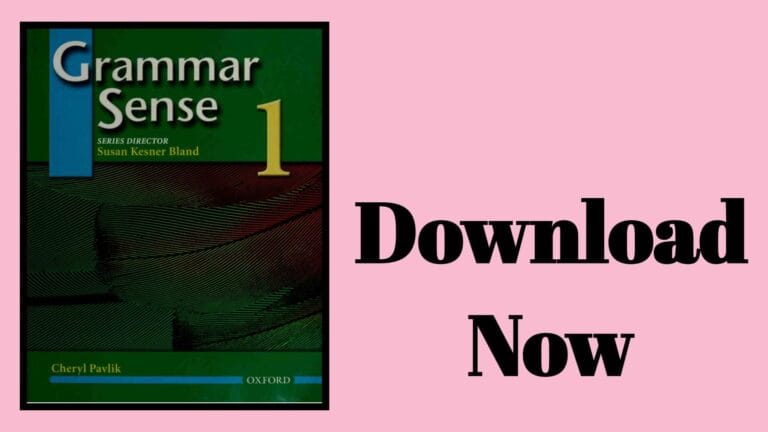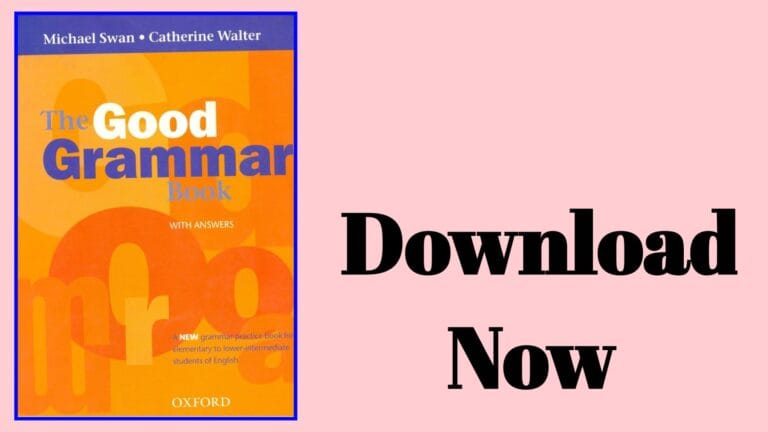
About “Oxford English Grammar Course”
Oxford English grammar course is a complete English grammar course designed especially for students of English grammar. The course covers all topics from basic to advanced levels; that is, A1 and A2, B1 and B2 and C1 and C2 levels have been covered in the course.
The particular ebook that has been provided to you in this post covers all the advanced topics of grammar. That is, the book touches on each and every essential advanced grammar aspect. Advanced grammar aspects from parts of speech to modal verbs have all been covered in the book.
One of the most appealing facts about the book is that it teaches you not only the advanced topics but also the basics of grammar. The aim is to make you revise the basic grammars and teach you the advanced concepts of grammar. Therefore, start reading the book with great enthusiasm as you’re going to learn the basic as well as the advanced topics.
Is Grammar Important in English?
Yes, grammar is certainly important in the English language. If vocabulary is the raw vegetables, then grammar is the knowledge to cook the vegetables. Grammar teaches you how you can use words, phrases, clauses and sentences without making any errors.
To be able to speak in English requires you to know how the words sound, what are the everyday words and how to use them so that others can understand you without any difficulty. That is, apart from learning English vocabulary and pronunciation, you need to focus on learning grammar rules that help you put together in a correct order.
Overall, grammar ensures understandability of your sentences. If you don’t learn grammar or use your sentences in a wrong order, people may find hard time understanding you which may result in communication failure. Thus, grammar ensures the smooth conveying of your message.
How to Learn English Grammar?
- Learn grammar from a tutor: The best way to teach yourself English grammar is to learn from an experienced teacher. The teacher can teach you what to learn, how to learn and how much to learn. The teacher can make you good at learning grammar.
- Use a standard book: Using a standard grammar book as supplement is a good idea which helps you not only learn the grammar rules but also ingrain them into your long term memory with its best practice exercises. Make sure to use the book which is related to your grammar level.
- Learn grammar from a website: Learning grammar from a grammar teaching website can be a great help in your grammar learning journey. There are many authoritative websites to learn grammar such as British Council Grammar or Oxford Grammar Today.
Table of Contents
Part 1: Word and Sentence Grammar
Section 1: Basic Sentence Types
Introduction
Questions: revise the basics
Negatives: revise the basics
Not and no
Negative questions
More about negatives
Imperatives
Let’s, let me, etc.
Exclamations: revise the basics
More practice
Section 2: Be, Have and Do
Introduction
Be: progressive forms; do be
There is: revise the basics
There is: more complex structures
Have: revise the basics
Do: emphasis
Section 3: Present and Future
Introduction
Present tenses: revise the basics
Instructions, commentaries, stories
More about present tenses
Non-progressive verbs
Future: revise the basics: will, going to, or present progressive?
More about the present progressive, going to and will
Be + infinitive: I am to …, etc.
Future progressive
Future perfect
Future in the past
More practice
Section 4: Past and Perfect Tenses
Introduction
Simple past and past progressive: revise the basics
Present perfect and simple past: revise the basics
Present perfect progressive: revise the basics
Simple past and present perfect: summary
More about simple past and past progressive
More about the present perfect
More about the present perfect progressive
Past perfect: revise the basics
More about the past perfect
Time conjunctions
Past perfect progressive
This is the first time, etc.
More practice
Section 5: Modal Verbs
Introduction
Modals: revise the basics
Ability: can and could
Permission: can, could, may, and might
Obligation: must and have (got) to
Obligation: should and ought to
Certainty: must, can’t, will, should
Probability and possibility: may, might, can, could
May have gone, should have told, etc.
Had better
Be supposed to
Will and would: willingness; typical behaviour
Used to
Need
More practice
Section 6: Passives
Introduction
Revise the basics
Reasons for using passives
Complex passive structures
Other advanced points
More practice
Section 7: Infinitives and -ing Forms
Introduction
Revise the basics
Perfect infinitives and -ing forms
Infinitive without to
Verb + infinitive
Verb + -ing form
Verb + object + infinitive or -ing form
Infinitive and -ing form both possible
Infinitive with its own subject: for … to …, etc.
Determiners with -ing forms: my speaking etc.
More practice
Section 8: Various Structures with Verbs
Introduction
Verbs with object + adjective/noun complement
Revise the basics: verbs with prepositions and adverb particles
More about prepositional verbs
More about phrasal verbs
Verbs with two objects
Some causative structures with have, get, and make
More practice
Section 9: Nouns and Pronouns
Introduction
Countable and uncountable
Mixed singular and plural
Noun + noun or preposition structure
Possessive structure or other structure
Nouns for activities: using have, make, do, etc.
A note on gender: he, she, or it?
Structures after nouns
Personal pronouns
Reflexives (myself, etc.); each other/one another
One, you, and they (general meaning)
Singular they
One(s)
More practice
Section 10: Determiners (1): Articles, Demonstratives, and Possessives
Introduction
Articles: preliminary note
Articles: revise the basics
More about generalising with a/an and the
Articles: other points
Demonstratives: this, that, these, those
Possessives: my, mine, etc.
More practice
Section 11: Determiners (2): Quantifiers
Introduction
All
Whole and all
Both
Either and neither
Every and each
Some, any, no, none: revise the basics
Some/any or no article
More about some
More about any and no
Much, many, more, and most
Little, few, less, fewer, least, and fewest
Enough
Quantifying phrases
Of with quantifiers
More practice
Section 12: Adjectives, Adverbs, and Comparison
Introduction
Adjective or adverb?
Adjectives: order
Position of adjectives
Participles used as adjectives
Adjectives without nouns
Structures after adjectives
Adverb position (1)
Adverb position (2): with the verb
Comparison: as … as
-er and -est or more and most?
Double comparative structures
More about comparatives
More about superlatives
Much, far, etc. with comparatives and superlatives
Much in affirmative sentences?
Such and so
Like and as
More practice
Section 13: Prepositions
Introduction
Time: revise the basics
In and on (place): revise the basics
At (place and movement): revise the basics
Prepositions with -ing forms
End-position of prepositions
Prepositions before conjunctions
Six confusable prepositions
Six more confusable prepositions
More practice
Section 14: Conjunctions, Clauses, and Tenses
Introduction
Conjunctions: revise the basics
And and or
Double conjunctions: both … and; (n)either … (n)or
Tense simplification after conjunctions
Past tense with present or future meaning
More practice
Section 15: Adjective (Relative) Clauses
Introduction
Relatives: revise the basics
Identifying and non-identifying relative clauses
Reduced relative clauses
Prepositions in relative clauses
Relatives: other points
More practice
Section 16: Noun Clauses
Introduction
Indirect speech: revise the basics
Indirect speech: more about tenses
Indirect speech: other points
Verbs in that-clauses: subjunctives
Verbs in that-clauses: should
More about question-word clauses
Preparatory it
More practice
Section 17: Adverb Clauses
Introduction
If: how many conditionals?
If: revise the basics
Unless
If and in case
If: more advanced points
If: informal structures
Notes on some conjunctions
Whoever, whatever, wherever, etc.
Participle clauses
After -ing, on -ing, etc.
Infinitive clauses
More practice
Part 2: Grammar Beyond the Sentence
Information structure: what comes first?
Information structure: getting the right subject
Pronoun problems
Linking clauses with conjunctions and adverbs
Special word order: fronting
Special word order: inversion
Emphasis: it … that
Emphasis: what … is/was
Discourse markers
Reading complicated sentences
Complex noun phrases in writing
Mixed structures
Ellipsis after auxiliaries
Ellipsis with infinitives
Ellipsis with so and not
Ellipsis after and, but, and or
Ellipsis at the beginning of spoken sentences
The structure of spoken sentences
Short answers, reply questions, and question tags
Three kinds of spoken question
Politeness: using questions
Politeness: being indirect
Emphasis in speech: stress
Repetition
Abbreviated styles
News headlines
Summary: Oxford English Grammar Course
Learning English grammar is an important part of learning journey when it comes to learning the English language. Therefore, you need English grammar using all the possible methods of learning including learning from an experienced teacher, a standard grammar book or an authoritative website.
To improve grammar, you can also use grammar ebooks which are dedicated to learning grammar and designed for students according to their grammar levels. To ease your learning journey, we provide you with the following pdf book which you can use for enhancing your grammar skills.


